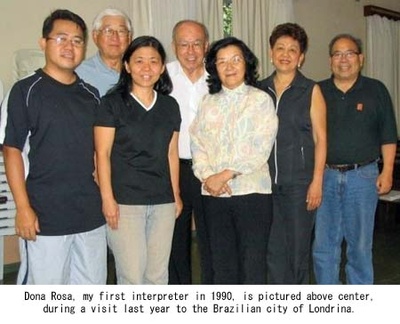My first meal during my first visit to Brazil was in a conference center just an hour from São Paulo’s international airport. This would be my first Nikkei leadership conference in Brazil, my first time for everything.
We arrived at the hour of almoço (lunch) and I was handed a plate. I soon found myself standing in line for lunch in the cafeteria. There were people behind tables serving us as we passed in front. The first person scooped what looked like rice onto my plate. It was fluffy and slightly yellowish. She said, "mize?"
Here's where the realization came about possible language problems. I spoke English. They didn't. Uh oh!
I did a fast archival search in my brain to think of what Spanish words I might know. I mean I had lived in San Diego and the east San Gabriel Valley; one hears Spanish all the time. I remembered that "maize" is the word for corn. “Maize” sort of sounds like "mize," right? I mean, who knows? Portuguese and Spanish are related; the words could be approximately the same. I reasoned all of this to myself in 0.23 seconds.
So, I determined that she was telling me that the stuff on my plate was corn. Okay, fine. I nodded my head and acknowledged that it was corn, and she put another scoop of the fluffy, yellow concoction on my plate.
But, you know, it didn't look like corn; it still looked like rice. But who knows how they prepare corn in this country? As though she could read the uncertainty in my mind, she again said, "mize?" (My brain heard, "corn?") I nodded my head again, and I got still another serving on my plate.
I heard someone down the food line speaking in English. It appeared that she was addressing me. She introduced herself to me as Dona Rosa, a Nisei Brazilian. She asked, "Do you know what she's saying to you?" My answer, "I think she's telling me that this is corn." Rosa laughed and said, "No, she's asking you if you want more."
So THAT'S why the woman kept spooning more servings on my plate!! "Mize" (mais) means "more," and every time she said "mize," I would nod my head agreeing that it was corn when, in fact, she was simply offering me another helping!!
By the way, the Brazilian Portuguese word for corn is "milho" (meel-yoo).
Once and awhile, when faced with language difficulties, we luck out when someone like Dona Rosa steps up to help us out of our dilemma. Other times we're on our own. One such occurrence happened in the southern Brazilian city of Curitiba. This experience turned out to be an important learning tool for me as I would later think about how we deal with others who may not have language skills.
I wandered into a shoe store in a shopping area in this city. Curitiba has a distinctive European feel to it, having been settled principally by Italian immigrants. It was, at that time, one of Time Magazine’s Top Ten Cities in the world. In the early '90s, it wasn't much of a tourist-sensitive city.
On this visit, one of my first, I saw a pair of shoes in the store window and went inside to try them on. You should know that shoe sizes were (and are) measured in what I can only assume is the metric system. The shoes were labeled in the 30's and 40's. I only knew that I needed seven and a half. I agreed to have my foot measured, and the sales associate went to the back to find the style and size. She returned with one pair, and I tried them on.
"My orr?" she asked. I looked at her not understanding. I think I must have mumbled something and lifted my shoulders in the universal "I don't understand" gesture. She repeated herself louder and slower, "myy orrr?" I must have given the same blank look as I did in the lunch line at that leadership conference. She repeated a little more loudly and a little more slowly "MMMYYYYYYY ORRRRRRRRRRRR."
Okay, this is where I learned the all-important cross-cultural language lesson. Speaking louder and slower when people do not understand the language or the word is not the answer to inter-cultural diplomacy. It caused me to think later about how we as English speakers treat people of other cultures. We think that by speaking slower and louder that "those foreign people" will ultimately understand what we are saying.
Having that happen to me was a good lesson for application to my relationships with people. Her treatment of me caused me to think, "It's not like I'm hearing-impaired or mentally challenged. I just don't understand what you're saying." Of course, I didn't know enough Portuguese at the time to be able to say that to her. In her defense, I have to say that it wasn't her intention to be rude; she just wasn't very helpful.
It taught me that if I can't make contact with a particular word or phrase, it's my task to search for alternate words or phrases or gestures that will somehow create a bridge. It isn't helpful to simply use the same word over and over. Louder and slower doesn't help. I learned that if I'm the hometown guy, if this is my turf, then it's MY task to enable the visitor to feel welcome and comfortable and not to feel foreign and stupid. It's something I've taught cross-cultural teams ever since.
By the way, when the salesperson was asking me, "my or" (maior), she was asking me if I needed a larger shoe size. Maior means "larger." Larger? Larr jurr? LARRR JURRRRR?
© 2009 John Katagi







